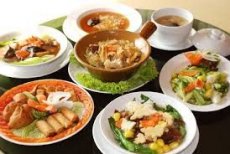Medical expert of the article
New publications
Nutrition after chemotherapy
Last reviewed: 04.07.2025

All iLive content is medically reviewed or fact checked to ensure as much factual accuracy as possible.
We have strict sourcing guidelines and only link to reputable media sites, academic research institutions and, whenever possible, medically peer reviewed studies. Note that the numbers in parentheses ([1], [2], etc.) are clickable links to these studies.
If you feel that any of our content is inaccurate, out-of-date, or otherwise questionable, please select it and press Ctrl + Enter.

Nutrition after chemotherapy should be complete, that is, include all the necessary elements for the recovery of the patient's body. Experience in rehabilitation therapy has shown that the better the patient eats, the faster he copes with the negative consequences of treatment. At the same time, the side effects themselves are expressed less intensely in patients.
The patient's daily diet should include the following food groups:
- Vegetables and fruits – in the form of salads, stewed and boiled dishes, raw vegetables and fruits, fresh juices.
- Poultry, fish and meat, as well as eggs.
- Cereals and grains – whole grain bread, sprouted grains, whole grain porridge, and so on.
- Dairy products, primarily fermented milk products.
Diet after chemotherapy
The diet after chemotherapy is based on the principles of healthy and nutritious nutrition. A patient who wants to restore his health must adhere to the following recommendations: 1.
- Eat small portions, but often – at least five to six times a day.
- Food should be consumed slowly, chewing thoroughly.
- Dishes should be steamed, boiled or baked in the oven.
- Each meal should contain a vegetable dish or greens.
- It is necessary to avoid fried, fatty, spicy, excessively salty and sweet foods.
- It is necessary to exclude smoked, pickled and canned foods from the diet.
- Meals should be prepared from fresh products that are environmentally friendly.
- It is necessary to drink a lot of fluids, at least two liters per day.
Juices after chemotherapy
Freshly prepared juices play a major role in restoring the health and well-being of the patient after chemotherapy.
The main role is given to juice therapy in restoring the body's hematopoietic functions, preventing anemia, improving the functioning of the gastrointestinal tract, liver and kidneys, as well as increasing immunity and reducing allergic reactions.
Useful juices after chemotherapy are:
- Pomegranate juice.
- Beetroot-carrot-apple.
- Carrot juice.
- Pumpkin and apple.
- Pumpkin and carrot.
- Beetroot-carrot-cucumber.
- Parsley and celery juice.
- Orange-lemon or orange-grapefruit juice.
Juice therapy should be long enough - at least a month. At the same time, you need to drink two glasses of juice every day. At first, you can do this by a third of a glass, and dilute it a little with clean water, and then, as your health improves, drink more juice and undiluted.
The diet of patients after chemotherapy should be balanced, that is, consist of fresh and environmentally friendly products with all the necessary components - proteins, fats and carbohydrates, as well as vitamins and minerals.
Products after chemotherapy
Recommended foods after chemotherapy are divided into four main groups.
Protein products:
- legumes – beans, soybeans, peas,
- nuts and seeds,
- eggs,
- fish,
- meat - veal, beef, pork, poultry,
- offal - liver.
The products of this group contain protein, B vitamins and iron. The protein group of products should be included in the diet twice a day.
Dairy products:
- kefir, fresh curdled milk, fermented baked milk, natural yogurt,
- cottage cheese and cheese,
- butter, milk.
This group of products contains calcium, which is necessary for the body, as well as essential vitamins and protein. At the same time, fermented milk products help restore intestinal microflora after dysbacteriosis. They should be included in the diet twice a day.
Fruits and vegetables:
- in the form of raw and boiled vegetables, salads and fresh fruits, juices and dried fruits,
- citrus fruits – grapefruits, oranges and tangerines,
- apples, quince and other fruits and berries with a high content of vitamin C,
- brightly colored fruits, vegetables and berries to improve hematopoiesis function,
- different types of cabbage, zucchini, eggplant, beets, carrots, sweet peppers,
- greens – parsley, dill, spinach, celery, green onions.
These products should be included in every meal, at least four to five times a day.
Cereals and bread:
- whole wheat bread,
- cereals - oatmeal, buckwheat, corn,
- sprouted grains.
These products saturate the patient's body with carbohydrates and vitamins. It is necessary to consume these products four times a day.
Honey and other bee products are also useful – propolis, royal jelly, pollen, and so on.


 [
[